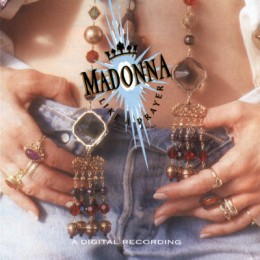Just Like a Muse to Me
 A Monday-morning five-star review from the Rolling Stone “Hall of Fame.”
A Monday-morning five-star review from the Rolling Stone “Hall of Fame.”
Madonna, Like a Prayer (1989)
When people talk about Madonna exposing herself, they normally mean her tendency to drop her knickers. But her fourth proper album, 1989’s Like a Prayer, is filled with nakedly emotional songs such as “Promise to Try,” (about her mother, who died when Madonna was just six) and the mournful “Oh Father” (just guess). “The album is drawn from what I was going through when I was growing up,” Madonna told Rolling Stone. As always, she had a kicker: “I’m still growing up.”
So Like a Prayer was the sound of Madonna figuring out her life, most explicitly on “Till Death Do Us Part,” a thinly fictionalized portrait of her volatile marriage with Sean Penn. But it was also the sound of a pop diva who had been taking vocal lessons and wanted to show off. Later, this would lead to an unfortunate tendency to tackle show tunes by Stephen Sondheim and Andrew Lloyd Webber. But here it meant that she not only belted blockbuster singles such as “Express Yourself,” she indulged in gentle psychedelia (“Dear Jessie”) and a slow, grinding collaboration with Prince, “Love Song.” Who would have guessed then that pop music’s two leading imps of the perverse would end up as two of its most publicly devout figures (Prince with the Jehovah’s Witnesses, Madonna with Kabbalah)?
That Sacred vs. Profane tag-team wrestling match was showcased in the glorious title track, where Madonna declared “Everyone must stand alone,” and then “I’m down on my knees / I wanna take you there,” seeking succor in both God and fellatio, or maybe fellatio with God. In a career full of transgressive moments, “Like a Prayer” is the trangressiviest. The music that comes with it is irresistible: dramatic guitar skronk, a gospel choir, an amazing bassline. That’s not coincidence–it’s Madonna showing you what divine inspiration means for her.
(By Gavin Edwards. Originally published (in a marginally shorter version) in Rolling Stone 955 (August 19, 2004).)
(It will perhaps not surprise you to learn that an editor changed “transgressiviest” to “most transgressive” for the print edition.)
posted 9 May 2011 in Reviews and tagged Madonna, RSHOF. 4 comments



May 9th, 2011 at 8:53 am
Nice work. Love this album.
the mournful “Oh Father”
Two decades on I’m still mystified that she/Sire thought this song was a single. Even for a megastar at the height of her popularity, it’s a turgid, radio-unfriendly ballad, and it killed her momentum to some extent. Seriously: it broke a five-year record of Top Five hits dating from “Lucky Star” in 1984 to “Cherish” in 1989, a 16-single streak that I believe remains unbeaten in the annals of the Hot 100; “Oh Father,” the followup to “Cherish,” peaked at No. 20. She never fully recovered.
May 11th, 2011 at 8:54 am
What about “Spotlight” from You Can Dance, which hit #32 in early 1988?
May 11th, 2011 at 8:54 am
(And which I can’t even hum–I have zero memory of it.)
May 11th, 2011 at 12:07 pm
You’re looking at a Joel Whitburn book, right? Look to the right of the entry for “Spotlight” and you should see an “[Air]” or “[A]” legend next to it. That means it only made the airplay chart (a.k.a. Hot 100 Airplay or Radio Songs), not the Hot 100. Madonna didn’t release it as a single in America (only Japan, if the Wikipedia entry is correct), and under pre-1998 Hot 100 rules it wasn’t eligible for the big chart. So her streak remained intact. (In chart-geek circles it was a big deal in ’89 when “Oh Father” ended that Top Five streak.)
There are all sorts of asterisks next to chart feats like this one from back in the day. Around the same time in the late ’80s, Whitney Houston scored a record seven consecutive Hot 100 No. 1s…*if* you don’t count “Thinking About You,” a 1986 single from her debut album that was only promoted to R&B radio and didn’t appear on the Hot 100 at all. If it counts, then it interrupts the streak; but by not making the pop chart at all (back in the day when R&B radio playlists weren’t counted toward the Hot 100, only Top 40 stations), chart talliers take an out-of-sight-out-of-mind attitude. Same goes for Madonna and “Spotlight.”
Final thought: Chart streaks like this are almost impossible to keep up nowadays, now that radio-only songs are eligible for the Hot 100 and every track on an album is for sale on iTunes and hence Hot 100-eligible. For example, Lady Gaga has an impressive perfect streak of Top 10 hits going right now — nine hits, everything she’s charted on the Hot 100 since “Just Dance” in late ’08 — but I expect that to end the minute her new album drops. The week after that, probably four to six album cuts from ‘Born This Way’ will make the Hot 100 for a week or two, none of them anywhere near the Top 10, and through no fault/failure on Gaga’s part the streak will end.